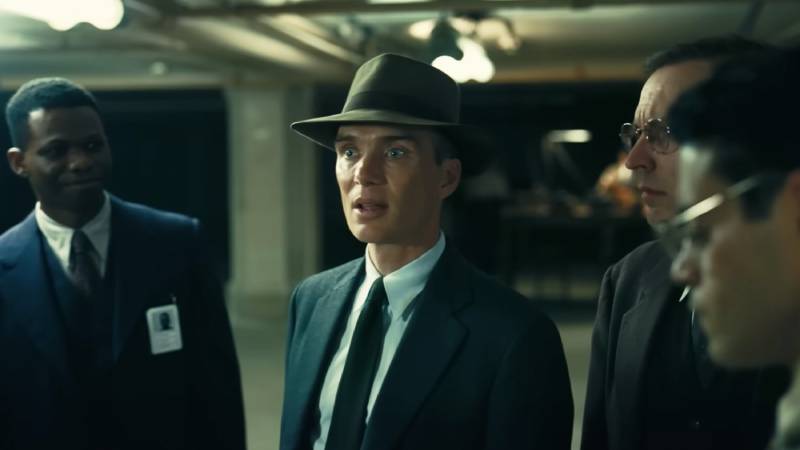




It took me nearly four weeks to watch Christopher Nolan’s Oppenheimer for a number of reasons. Firstly, I was still recovering from my Barbie-induced comma, thoroughly enjoying my existence in an alternative pink world. Secondly, I am not a big fan of the 53-year-old British-American director: I find his aesthetics irritating, and his movies boring and pretentious. Thirdly, our talented writer Victoria Luxford had already written a review of the film for DMovies. To top it all up, the accusations of sexism – with many pundits pointing out that all of Nolan’s film may fail the Bechdel Test – made me even less enthusiastic about watching it. But nothing, absolutely nothing, could prepare me for what I was about to see. Oppenheimer is far worse than I feared. Not in my wildest dreams did I anticipate such a poorly disguised, shameless celebration of US military belligerence. A geopolitical weapon as dangerous as the atomic bomb. It has the power to destroy critical thinking, to whitewash mass murder, and to erase solidarity with the victims.
Let’s start with the topic of female representation. I believe that the accusations of sexism are entirely founded. Not only does the film fail the Bechdel Test, but also the only two significant female characters are entirely one-dimensional and uninspiring. J. Robert Oppenheimer’s (Cillian Murphy) lover Jean Tatlock (Florence Pugh) only appears a few times, and she’s almost invariably naked (whats are lovers for, after all?). She exists solely for the purpose of providing Oppie’s consciousness with a sounding board. His wife Kitty (Emily Blunt) has a permanently sad and gloomy face, and very little to say about her husband’s predicament. Plus, despite having a baby, she is entirely desexualised (asking a woman to be a mother AND a satisfactory sex partner both at once is just a little too much, isn’t it?). There is no female politician or scientist at sight, except for a woman who Oppie promptly orders: “put her in the plutonium team”, only for her face never to be seen again. Is this a reflection of the time? Not entirely. An American woman received the Nobel Prize for Medicine in the 1940s (the decade in which most of the film takes place). Several African-American women received a PhD, and one became a staff supervisor at Nasa. American physicists Frances Spence, Ruth Teitelbaum, Marlyn Meltzer, Betty Holberton, Jean Bartik and Kathleen Antonelli became the first computer programmers in the world. All roughly at the same time.
 .
.
.
The first dirty trick
Since the end of WW2, the US has promoted the false idea that the bombings of Hiroshima and Nagasaki were necessary, and that they saved more lives than they claimed. It has furiously dismissed those who question the dubious paradigm as anti-patriotic haters. Oppenheimer seeks to cement this lie further, permanently silencing any discussion.
Nolan’s historicity is highly selective. It barely acknowledges that the War in Europe was finished and Hitler was dead when bombs were dropped, and that a Japanese surrender was likely in August 1945. Not a triviality. These crucial facts are very quickly brushed over, and never discussed in detail. This is no mean feat in a film with a duration of three hours. The entire moral argument for developing the a-bomb repeated. several times in Oppenheimer is that the Americans should build “the strongest explosive” before Germans and Russians. Such argument was no longer valid at the time the weapons were detonated. Dwight Eisenhower, supreme allied commander and future president of the United States later confessed to his biographer that both bombings were not needed at all. He claimed that “the Japanese were ready to surrender” and that “it wasn’t necessary to hit them with that awful thing”. He concluded: “I hated to see our country be the first to use such a weapon”. His words should have been emblazoned in the opening of the film; instead they are omitted.
Simply put, the bombings of Hiroshima and Nagasaki were just a grotesque display of geopolitical strength.
The film spends a long amount of time on shoddy physics lessons (so incomprehensible that I had to look up “quantum mechanics”, “isotope” and even the difference between the atomic and the hydrogen bomb as soon as the film was finished) and tedious debate between scientists and politicians – why could it not allow a significant amount of time for essential geopolitical contextualisation?
Trump challenged Obama not to apologise on his trip to Hiroshima in 2016. He never did. Nor did Biden, who visited the Japanese city just this year. On the other hand, Japan have apologised profusely for Pearl Harbor. That’s because Americans take it for granted that the use of the atomic bombs in Hiroshima and Nagasaki was inevitable, and any discussion around this topic is not welcomed. Oppenheimer attempts to corroborate this falsehood by inserting a character boldly claiming that the Japanese “will never surrender”, without providing any evidence whatsoever to support this very questionable assertion. There is even a touch of sadism: “I bet the Japanese didn’t like it”, says a smirking Oppie about his invention.
The bombings of Hiroshima and Nagasaki were a turning point in American history, the time when US firmly established itself as the most powerful nation in the world. It is barely convenient for the US government to reveal that their destructive foreign policy has killed in excess of 20 million people worldwide since WW2 (that’s more than three times the number of Jews killed by the Nazis in the conflict). Well, I expect no American president to challenge the false orthodoxy and apologise, but I do think that cinema has the duty to subvert these paradigms and open people’s minds. Cinema should question the unquestionable. Nolan’s film does precisely the opposite: it legitimises it. Despite its seemingly explosive nature, Oppenheimer will not open any minds. On the contrary.

.
The second dirty trick
There is another significant dirty trick in Oppenheimer, this time not a historical one but an illustrative one instead. The total number of casualties (220,000) is indeed mentioned in the film, however it is never represented. Responsive mimicry (ie. the sentiments of allegiance, compassion and solidarity that film elicits from viewers) requires a visual or at the very least a sound representation. Oppenheimer has neither. Just the mere mentioning of a number is not enough. We never see the face of these victims, we never hear their voices. This could have been 220,000 cows, pigs or bees. These victims are entirely robbed of their identity and their humanity. We never see a Japanese person in the movie (even the word “Japanese” is barely uttered). Not even in the extensive oneiric/allegorical sequences (surely if Oppenheimer was that tormented by the deadly repercussions of his creation, he would envisage the victims in his dreams) Instead, the explosion is presented as something beautiful, hypnotic, even fascinating. We watch the overpowering fire, the mushroom cloud and creepy atomic representations fly around at the speed of light with a loud buzzing sound, but we never see the destruction that they caused on Japanese soil. Not one frame, not for one split second. At one specific moment, Oppie laments that he has “blood in his hands”, however we never see the colour of such blood (neither a real-life representation nor a representation in the dreams that allegedly torture our noble protagonist). And we never hear these 220,000 people talk, scream in agony, or desperately plead for their lives. Not for one split second.
It is downright insulting that someone should make a film about the alleged suffering of the creator of the atomic bomb, while blatantly and entirely neglecting the suffering of the Japanese. Viewers are consistently made to empathise with the tormented yet virtuous protagonist, and never with the real victims.
By sanitising mass murder, Christopher Nolan makes it palatable, even beautiful and enjoyable to watch. So beautiful that for a few moments sound is almost entirely removed so viewers can enjoy the colours of fire in their full splendour. People head to their local IMAX in order to experience what it’s like being inside the flames of bombs that destroyed Hiroshima and Nagasaki, however Nolan never puts his audiences in the shoes of those who suffered the most. I could almost see an Oppenheimer Disney ride soon, magnificent with pyrotechnics and sound engineering, the pinnacle of bad taste, but not a sign of what it was like to be on the ground of Hiroshima and Nagasaki at the time. It seems that the American company may already be moving in that direction.
This is not dissimilar to what Nolan did in Dunkirk (2017), another bloodless, non-violent, and bewitching portrayal of WW2 (something I discussed years ago in my article “Why does Nigel Farage like Dunkirk so much?”).
While painted as some sort of self-reflective historical drama, Oppenheimer barely allows for any sort of reflection. None of Christopher Nolan’s films do. The frenetic editing (there is a cut every few seconds), rhetorical dialogues and incessant music are not conducive to reflection but to manipulation instead. Oppenheimer hardly allows audiences to breathe, let alone to think. This is a movie that instead tells people how to think. And the conclusion is crystal-clear: the atomic bombs were necessary, and those who invented and oversaw its use were deeply moral and responsible people.
Despite setting out to present Oppie as a man tortured by the repercussions of his invention, that’s hardly the case. Our protagonist does not dwell on guilt and misery for too long (except perhaps in the final 15 minutes). And it’s not mass destruction that torments him. His biggest fear is that the explosion could not be contained, triggering a chain reaction that would destroy the entire world (including the US), a concern dismissed by Albert Einstein. And he is more worried about proving his allegiance to the US than reflecting on the human cost of his invention.

.
The greatest nation of all
The biggest focus of Oppenheimer is on the race to develop the atomic bomb. Such scientific prowess is celebrated ad infinitum. Oppie and his associates are jubilant at the first controlled explosion of the atomic bomb. At one point a scientist does bemoan that “hundreds of years of physics could culminate in a weapon of mass destruction”, but this concern is quickly discarded as the film consistently fails to reveal that the use of the bomb may have been entirely redundant. A show-off of military power, with some meaningless six-digit figure attached to it (the number of casualties). This is hardly unusual in US foreign policy. When questioned about the deaths of 500,000 Iraqi children (the figure being explicitly compared to casualties of Hiroshima and Nagasaki), Bill Clinton’s Secretary of State Madaleine Albright infamously replied: “The price is worth it”.
We soon learn that anything is “worth it” in the name of American imperialism. About a third of the film (mostly in the end, in a narrative that confusingly zigzags back and forth in time) consists of Oppenheimer on trial years after the war. But it’s not for the murder of 220,000 innocent people. It is his loyalty to the US that’s being judged. Many suspect that Oppie is a secret Soviet agent, highlighting that his wife and friends were once members of the Communist Party. Oppie’s wife Kitty comes to his defence, asserting that she left the Communist Party… 16, 17… actually 18 years earlier, and that her husband was never a member. Phew, this vague left wing allegiance was just a fleeting mistake of youth. Oppie is a good American in whom we can trust after all!
In other words, Oppenheimer is a shameless apologia of American imperialism. An ardent emblem of nationalism. And a piece of propaganda.











